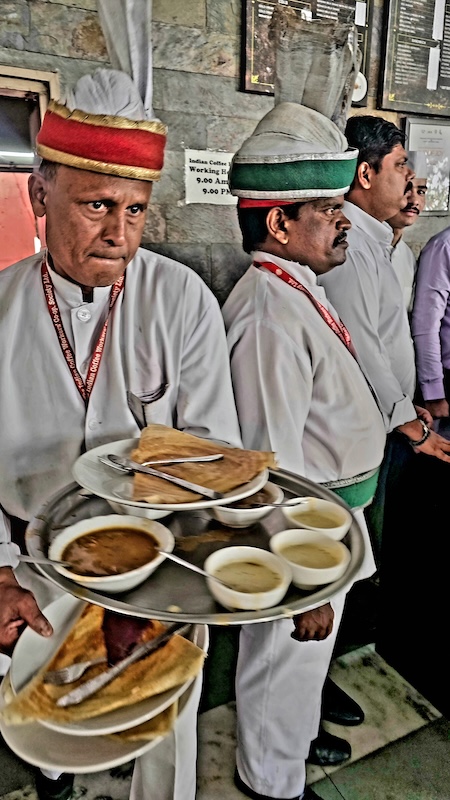
Circles and Lines of Stillness – 2nd Part ( Kathy – Jaipur – December 24)
French version below
At the heart of the JKK branch is Arun Ramakrishnan, a proud, human, and generous manager who has dedicated 20 years to the cooperative, with 15 years spent at the JKK location. Arun’s journey from the kitchen to leadership epitomizes the cooperative’s ethos: every employee is an owner, and the structure is built not on profit but on creating permanent jobs.
The team at JKK’s ICH includes 30 workers, 20 of whom work in the kitchen, and they serve between 200 and 400 customers daily. Open seven days a week from 9 AM to 9 PM, this branch is a lifeline for many, offering crispy dosas, strong filter coffee, and other South Indian delights at affordable prices.
Arun appreciates the democratic nature of the ICH experience. “We serve people from all walks of life,” he said. “It’s a place where everyone feels welcome” Many of the café’s patrons have been visiting since childhood, creating a sense of community that Arun likens to one big family.
The cooperative structure offers stability to its employees. Workers retire at 58 years old with a pension of up to ₹7,500 per month (86 €), an amount that is gradually increasing. Arun takes pride in the dignity and security it provides to its workers.
The organisation also comes with its quirks. Transfers within the cooperative society every 2–3 years to branches in cities like Delhi, Chandigarh, or Shimla are common, a practice that Arun believes makes it difficult for women to work here. Most of the current team hails from Northern India, including states like Uttar Pradesh, Haryana, Himachal Pradesh, Bengal, and Odisha, though Arun himself comes from Thrissur, Kerala.
A Unified Experience
For someone like me, who finds Jaipur’s stark realities often disheartening, JKK and the Indian Coffee House offer a rare glimpse of what the city could be: thoughtful, inclusive, and enduring. Together, they create a sanctuary where culture, sustainability, and community come together seamlessly.
In my travels, I’ve visited many Indian Coffee Houses all over India but the JKK branch holds a unique charm and design. Its setting within the sandstone embrace of Jawahar Kala Kendra elevates it beyond a café—it’s a contemporary space for reflection, dialogue, and connection.
Through my writing and explorations, I strive to pay tribute to the workers and customers who sustain this institution and almost mythical cooperative. The Indian Coffee House isn’t just a dining space; it’s a living tradition and a testament to the power of cooperatives. For anyone navigating Jaipur’s intensity, JKK and its Indian Coffee House are a reminder of the beauty that endures amidst the chaos.
# Cooperatives Build Prosperity for All
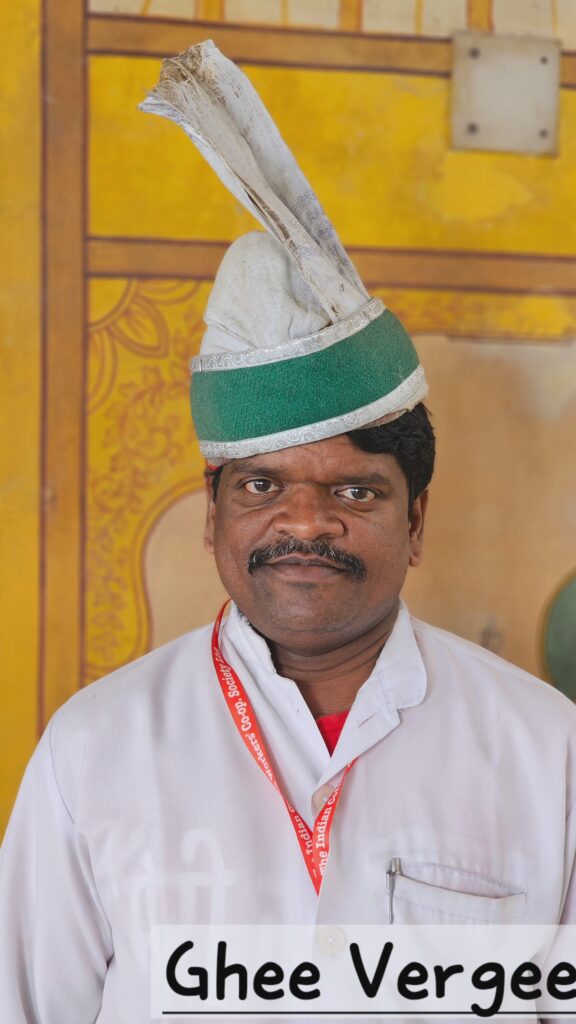
Arun a passé 20 ans au service de la coopérative, dont 15 ans dans l’enceinte de JKK. Parti de la cuisine pour arriver à la direction, son parcours reflète l’essence même de cette coopérative unique : ici, chaque employé est propriétaire, et l’objectif n’est pas le profit, mais la création d’emplois durables.
L’Indian Coffee House de JKK, c’est une équipe de 30 travailleurs, dont 20 s’affairent en cuisine pour servir entre 200 et 400 clients chaque jour. Ouvert 7 jours sur 7, de 9 h à 21 h, ce café est bien plus qu’un simple lieu de restauration. C’est une bouffée d’air pour les habitants et les visiteurs, avec ses dosas croustillants , son café filtre corsé et ses délices sud-indiens accessibles à toutes les bourses.
Arun aime la dimension démocratique de l’ICH. « Nous servons des gens de tous les horizons » dit-il. « C’est un endroit où chacun se sent bienvenu. » Certains clients y viennent depuis leur enfance, forgeant une communauté qu’Arun décrit comme une grande famille.
La coopérative garantit également une stabilité précieuse à ses employés. À 58 ans, ils prennent leur retraite avec une pension pouvant atteindre 7 500 ₹ par mois (86 €), un montant qui augmente régulièrement. Arun se réjouit de la dignité et de la sécurité que ce modèle offre.
Mais tout n’est pas parfait. Les transferts fréquents, tous les 2 ou 3 ans, vers des villes comme Delhi, Chandigarh ou Shimla, compliquent les choses, notamment pour les femmes. Aujourd’hui, la plupart des employés viennent du nord de l’Inde, d’États comme l’Uttar Pradesh, le Haryana, l’Himachal Pradesh, le Bengale ou l’Odisha, tandis qu’Arun, lui, est originaire de Thrissur, au Kerala.
Une expérience à part
Pour moi, qui trouve parfois les réalités de Jaipur écrasantes, le JKK et l’Indian Coffee House sont une véritable bouffée d’air frais. Ces lieux incarnent ce que la ville pourrait être : réfléchie, inclusive, intemporelle. Ensemble, ils forment un lieu où culture, durabilité et communauté cohabitent harmonieusement.
Au fil de mes voyages, j’ai visité de nombreux Indian Coffee Houses à travers l’Inde, mais l’ICH de JKK a un charme et un design uniques. Nichée dans l’écrin de grès du Jawahar Kala Kendra, elle dépasse la simple notion de café dans cet espace contemporain.
À travers mes écrits et mes explorations, je m’efforce de rendre hommage aux travailleurs et aux clients qui font vivre cette institution mythique. L’Indian Coffee House n’est pas qu’un lieu de restauration ; c’est une tradition vivante et une preuve vivante du pouvoir des coopératives.
# Cooperatives Build Prosperity for All
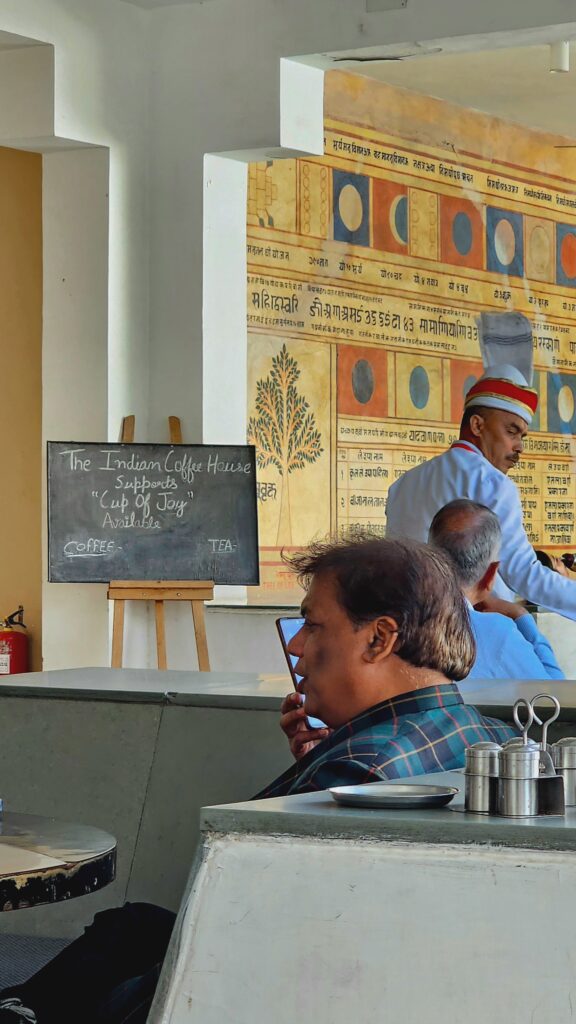


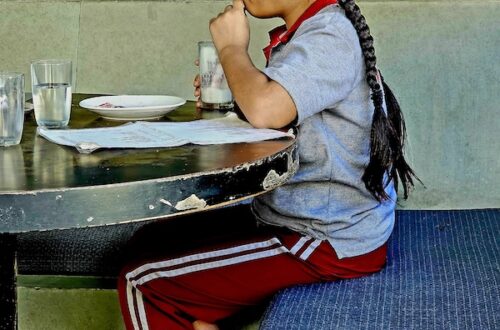

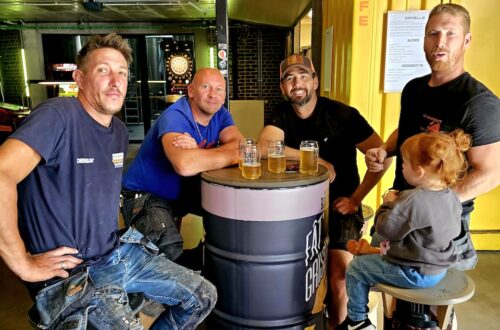
2 Comments
Adrian Kim
How should I put it? Looking at the photo, the colors and slightly worn-out colors contrast sharply with the hardships of the workers, making it feel like the hands of a clock are going backwards. Compared to the weight of the rough and heavy life, the coffee and food provided by the coffee house people are so light and brightening.
Kathy Van der Elst
Thank you for them, Adrian!